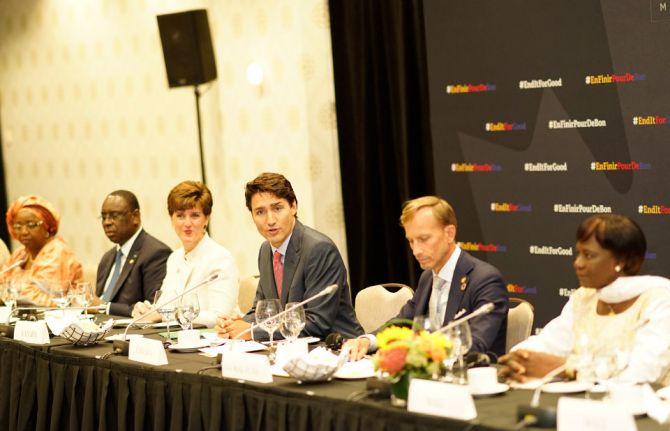

Press Statement
UNAIDS encouraged for future of HIV funding as donors pledge full support to the Global Fund
20 September 2016 20 September 2016GENEVA, 20 September 2016—UNAIDS applauds all donors and partners for their demonstration of a strong commitment to the Global Fund to Fight AIDS, Tuberculosis and Malaria (Global Fund). At its Fifth Replenishment Conference in Montreal, Canada, donors pledged US$ 12.9 billion of the US$ 13 billion called for by the Global Fund for the three-year period 2017–2019.
For the three diseases, the Global Fund estimates that the amount raised will save 8 million lives, avert 300 million infections and help build sustainable systems for health.
“The Global Fund is an essential partner to address the continuing epidemics of AIDS, tuberculosis and malaria,” said Michel Sidibé, Executive Director of UNAIDS. “Through an effective response to these diseases we can improve the lives of millions of people and simultaneously address poverty, inequality and discrimination. This replenishment is an enormous contribution to our collective ambition of ending AIDS.”
The new financial commitments represent a significant increase compared to the US$ 12 billion in pledges made at the previous replenishment conference. Private donors and innovative financing mechanisms more than doubled their pledges to the Global Fund compared to the last conference. Several new countries made pledges and others increased commitments, including Canada, Germany and Japan. In addition to pledging to the Global Fund, Côte d’Ivoire announced a pledge of US$ 1 million to support the work of UNAIDS.
In 2015, an estimated US$ 19 billion was available from all sources for the global response to HIV in low- and middle-income countries. Around 57% of resources were from domestic public and private resources and 43% were from international sources, including 23% from United States of America Government bilateral contributions, 9% from the Global Fund, 3% from philanthropies and the rest from other bilateral and multilateral sources.
To meet global targets to end AIDS as a public health threat by 2030, UNAIDS estimates that US$ 26.2 billion will be needed in 2020, around US$ 7 billion more than was available in 2015.
UNAIDS
The Joint United Nations Programme on HIV/AIDS (UNAIDS) leads and inspires the world to achieve its shared vision of zero new HIV infections, zero discrimination and zero AIDS-related deaths. UNAIDS unites the efforts of 11 UN organizations—UNHCR, UNICEF, WFP, UNDP, UNFPA, UNODC, UN Women, ILO, UNESCO, WHO and the World Bank—and works closely with global and national partners towards ending the AIDS epidemic by 2030 as part of the Sustainable Development Goals. Learn more at unaids.org and connect with us on Facebook, Twitter, Instagram and YouTube.
Press centre
Download the printable version (PDF)
